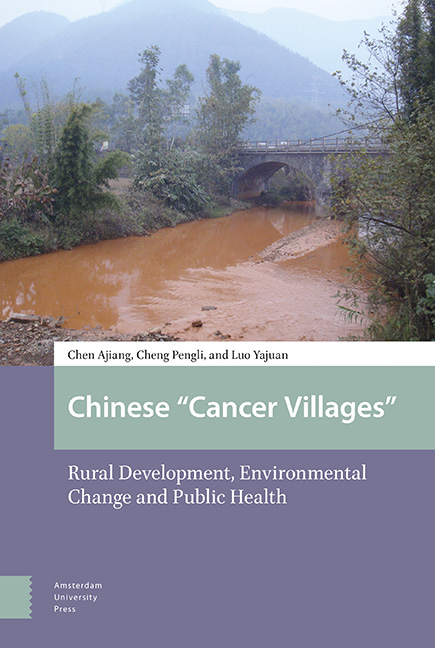Book contents
- Frontmatter
- Contents
- List of Figures, Graphs and Tables
- Acknowledgements
- Preface to the English Language Edition
- 1 Retrospective Thoughts on the ‘Cancer Village’ Phenomenon
- 2 The Ins and Outs of a ‘Cancer Village’
- 3 A Subei ‘Cancer Village’
- 4 Environmental Change and Health Risks
- 5 A Prosperous ‘Cancer Village’
- 6 Coexistence of Poverty and Cancer
- 7 Problematization and De-stigmatization
- 8 Behind the ‘High Incidence of Lung Cancer’
- 9 Villagers’ Perceptions of and Responses to the Relationship between Cancer and Pollution
- 10 Villagers Strategies for Mitigating Environmental Health Risks
- Index
- Index (Chinese) 中文索引
8 - Behind the ‘High Incidence of Lung Cancer’
Published online by Cambridge University Press: 20 November 2020
- Frontmatter
- Contents
- List of Figures, Graphs and Tables
- Acknowledgements
- Preface to the English Language Edition
- 1 Retrospective Thoughts on the ‘Cancer Village’ Phenomenon
- 2 The Ins and Outs of a ‘Cancer Village’
- 3 A Subei ‘Cancer Village’
- 4 Environmental Change and Health Risks
- 5 A Prosperous ‘Cancer Village’
- 6 Coexistence of Poverty and Cancer
- 7 Problematization and De-stigmatization
- 8 Behind the ‘High Incidence of Lung Cancer’
- 9 Villagers’ Perceptions of and Responses to the Relationship between Cancer and Pollution
- 10 Villagers Strategies for Mitigating Environmental Health Risks
- Index
- Index (Chinese) 中文索引
Summary
Abstract
After 2008, a movement opposing waste incinerators swept across many cities in China. At the time, there was already a conflictual relationship between L waste incinerator in Guangdong and surrounding residents, but the ‘Panyu incident’ caused what was originally a small local conflict to become an issue of wider and even national concern. The list of ‘cancer victims’ that circulated on the internet, and related media reports, gradually convinced the public that the waste incinerator plant was responsible for high rates of lung cancer among residents. However, our investigations found that there were numerous errors in the information about the incidence of lung cancer. The chapter discusses what we discovered about the complex background to this case, and the reasons why rumours and misinformation spread so easily at this time.
Keywords: cancer villages, rural industrial pollution, environmental conflict, internet rumours, social structure
Along with rapid economic development, urbanization and improving living standards, the amount of municipal household waste in China has been steadily increasing. Although investment in waste treatment facilities has also been rising, it is still hard to keep up with the demand. Because landfills require quite a lot of land, and can easily create secondary pollution, finding sites for them is becoming increasingly difficult. Incineration effectively reduces waste, takes up less space, and has clear technological and economic advantages. However, in recent years, there have been continuous mass incidents opposing waste incineration power plants in China. In 2009, in particular, Beijing, Shanghai, Guangzhou, Nanjing, Wujiang, and other areas all saw ‘anti-incineration’ movements. Strong public opposition caused some waste incineration power plant projects (we will abbreviate to ‘incinerators’ hereafter) to be stopped or postponed during the feasibility, planning or construction stage. Of these, the ‘Panyu Incident’ in Guangzhou had the biggest social impact. Continuous coverage of the incident in the media over several months, and fierce arguments and relentless debate between ‘pro-incineration’ and ‘anti-incineration’ groups suddenly pushed the issue of waste incineration to the centre of public debate.
- Type
- Chapter
- Information
- 'Chinese Cancer Villages'Rural Development, Environmental Change and Public Health, pp. 229 - 254Publisher: Amsterdam University PressPrint publication year: 2020



